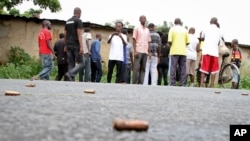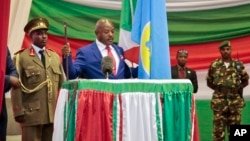Peace talks between Burundi’s government and opposition groups were supposed to be held Wednesday in Arusha, Tanzania, after discussions opened last month in Uganda.
But the talks were canceled, without being rescheduled — adding to the problems for a country that has been experiencing unrest since April.
A senior foreign affairs official said the government will not speak with those it says are “supporting violence.”
However, the next step must be government action, says Carina Tertsakian, Human Rights Watch senior researcher on Burundi and Rwanda.
"It is certainly regrettable that the different parties do not seem to be able to come together," Tertsakian said. "I would say on the government's side, the government does not seem to be acknowledging the urgency of the need to take measures to stop the violence."
Tertsakian noted there has been violence committed by the government and the opposition, but the government needs to admit its role.
"In particular, it is not accepting responsibility for the conduct of its own security forces, who have killed many people in Burundi since the crisis began,” Tertsakian said. “Instead, it is wholesale blaming the opposition groups for all the killings that are going on in Burundi, even though much evidence points to the contrary."
Denying peacekeepers
Last month, the African Union announced it would send 5,000 peacekeepers into Burundi to stop the violence.
President Pierre Nkurunziza responded that "everyone has to respect Burundi borders." Otherwise, he said, the country would consider itself under attack and would fight back.
Many people hoped the president's remarks would be further discussed at the Arusha talks, but Thierry Vircoulon, central Africa project director for International Crisis Group, said the peace force was likely just a threat.
"Well, I think that, actually, the African Union have threatened Burundi to deploy a peacekeeping force that it is does not have, and therefore the threat is not credible," Vircoulon said. "I mean, there are two problems. The first problem is the political approval by the member states, and the second problem is that this peacekeeping force does not exist."
Regime not motivated
Regardless of what the international community does to try to resolve the crisis, Vircoulon said he does not believe government officials have much incentive to negotiate.
"Despite the fact that the regime is already under stress, and especially financial stress, they have not moved," Vircoulon said. "They have not made any concession or any kind of thing. And because they are radicals, they are ready to go to the end. And unless they are put under tremendous pressure, they are not going to change."
The talks were intended to help stem the violence in Burundi, where at least 400 people have been killed since Nkurunziza announced he was running for a controversial third term in April. He won re-election in July, in a poll boycotted by the opposition.














